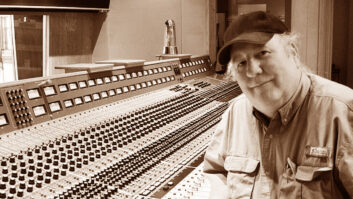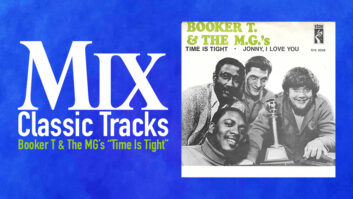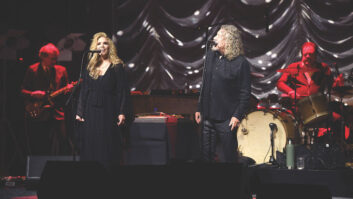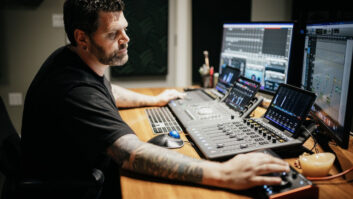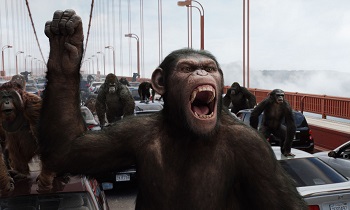
It’s that time of year, when Hollywood honors the year’s finest contributions in film production and post-production. For Mix, that means the best in film sound editing and mixing. Who will take home the statues from the 2015 CAS Awards, MPSE Golden Reels and Academy Awards? Check out the following contenders, with credit for the credits to imdb.com.
Dawn of the Planet of the Apes
The Apes prequels have proven quite lucrative and creative more than 40 years after the original appeared on screens. For the sound teams, they are a real gift, full of action, battles, weapons, horses, old and new technologies…these films require a vast amount of original sound effects and Foley recording. Rightfully the effects get a lot of attention; they’re good. And for the first time in the series they were mixed in an immersive format, Dolby Atmos. But in the Mix film sound event in September, rerecording mixer Andy Nelson pointed out that while the human vocals were restricted to the screen channels, the director gave them leeway to bring the ape vocals and group Ape ADR into the surrounds, creating a subtle and effective distinction.
Director: Matt Reeves
Movie Studio: 20th Century Fox
Sound Re-Recording Facility: 20th Century Fox
Re-Recording Mixers: Andy Nelson, Will Files
Additional Re-Recording: Christopher Barnett, James Bolt, Douglas Murray
Production Sound: Ed White
Sound Designer: Will Files, Douglas Murray
Supervising Sound Editor: Will Files, Douglas Murray
Sound Editorial: David Grimaldi, sound effects editor; Mac Smith, sound effects editor; John Morris, sound effects editor; Jack Whittaker, sound effects editor; Smokey Cloud, assistant sound editor; Mildred Iatrou, supervising dialog and ADR editor; Michael Magill, dialog editor; Kim Foscato, ADR editor (principal apes dialog); David Betancourt, ADR mixer; Jim Brookshire, ADR editor; Mark DeSimone, ADR mixer; Travis McKay, ADR mixer; Nancy Nugent, ADR editor; Simon Diggins, ADR mixer; Andy Malcolm, Foley artist; Dan O’Connell, Foley artist; Blake Collins, Foley mixer; John Guentner, Foley mixer; Scott Curtis, Foley editor.
Music By: Michael Giacchino
Music Scoring Mixer: Joel Iwataki
Music Editor: Paul Apelgren, Warren Brown, assistant music editor
How to Train Your Dragon 2

It’s Randy Thom doing sound on a big animated film. What’s not to like? Always inventive, detailed and a part of the storytelling, Thom has won an Oscar before designing sound for world’s that don’t exist, with Pixar’s The Incredibles. At the Mix sound for film event in September, during the keynote speech, Thom talked about sound’s contribution to the art of storytelling, using a scene from Dragon 2 to illustrate perspective shifts from within a main character’s head—subtle shifts with effects and movement to aid the image. When listening to the track with your eyes closed, it’s sometimes easy to forget that these animated worlds don’t really exist.
Director: Dean Deblois
Movie Studio: Dreamworks Animation; 20th Century Fox
Re-Recording Mixers: Randy Thom, Shawn Murphy, Brandon Proctor
Supervising Sound Designer: Randy Thom
Sound Designer: Al Nelson
Supervising Sound Editor: Randy Thom, Michael Silvers
Sound Editorial: Leff Lefferts, assistant re-recording mixer/assistant sound designer; Kevin Bloen, assistant sound re-recording mixer; Andre Fenley, assistant supervising sound editor; Mac Smith, sound effects editor; Brian Chumney, dialog/ADR supervisor; Maxwell Chamberlain, assistant dialog mixer; Roy Latham, original dialog mixer; Michael Miller, original dialog mixer/ADR mixer; Tighe Sheldon, original dialog mixerKyle D. Krajewski, original dialog recordist; Jason Oliver, ADR mixer; Andy Wright, ADR mixer; John T. Cucci, Foley artist; Sean England, Foley artist; Robin Harlan, Foley artist; Pascal Garneau, supervising Foley editor; Corey Taylor, Foley mixer; Sue Fox, Foley editor; Dan Randall, Foley recordist.
Music By: John Powell
Music Editor: Thomas A. Carlson, Tom Kramer
Music Scoring Mixer: Shawn Murphy
Gone Girl

Director David Fincher and sound designer Ren Klyce share one of those special collaborative relationships, going back to the early audio genius of Se7en and Fight Club. The crews have gotten slightly bigger, and the music team of Trent Reznor and Atticus Ross has already hauled in an Oscar of their own, but the core of the audio approach—deft realism as the anchor, with inventive un-realism as the flavor—stays the same. In this procedural thriller, Fincher described the Reznor-Ross tracks as “spa music…creating this feeling of being on anti-depressants.” See the November 2014 Mix for more on the film.
Director: David Fincher
Movie Studio: 20th Century Fox
Sound Re-Recording Facility: Skywalker Sound
Re-Recording Mixers: Ren Klyce, David Parker, Michael Semanick
Production Sound: Steve Cantamessa
Sound Designer: Ren Klyce
Supervising Sound Editor: Ren Klyce
Sound Editorial: Jeremy Molod, assistant supervising sound editor; Nathan Nance, assistant sound re-recording mixer; Bonnie Wild, assistant sound re-recording mixer; Malcolm Fife, sound effects editor; David Hughes, sound effects editor; Al Nelson, sound effects editor; Coya Elliott, assistant sound effects editor; Steve Orlando, assistant sound effects editor; Alyson Dee Moore, Foley artist; John Roesch, Foley artist; Mary Jo Lang, Foley mixer; Thom Brennan, Foley editor; Richard Quinn, dialog supervisor; Daniel Laurie, dialog editor; Doc Kane, ADR mixer; Chris Navarro, ADR mixer; Thomas J. O’Connell, ADR mixer; Gwendolyn Yates Whittle, ADR editor; Michael J. White, narration recording engineer.
Music By: Trent Reznor, Atticus Ross
Music Editor: Jonathon Stevens
Fury

Paul N.J. Ottosson hit big with an Oscar for Best Sound Editing for The Hurt Locker, then again for Zero Dark Thirty. In Fury, he is again involved with war, but this time going back to the 1940s, with all the period vehicles, weaponry, radios and background walla that such a film involves.
Director: David Ayer
Movie Studio: Sony/Columbia Pictures
Sound Re-Recording Facility: Sony Post-Production Studios
Re-Recording Mixers: Paul N.J. Ottosson, Marc Fishman
Production Sound: John Hughes
Sound Designer: Paul N.J. Ottosson
Supervising Sound Editor: Paul N.J. Ottosson
Sound Editorial: Lee Gilmore, sound effects editor; Jamie Hardt, sound effects editor; Hamilton Sterling, sound effects editor; Bruce Tanis, sound effects editor; Lynn Sable, assistant sound editor; James Morioka, dialog editor; Robert Troy, dialog editor; Russell Farmarco, ADR supervisor; Jon Olive, location ADR mixer; Robert Edwards, ADR mixer; Howard London, ADR mixer; James Simcik, ADR editor; Nerses Gezalyan, Foley mixer; Scott Curtis, Foley editor.
Music By: Steven Price
Music Supervisor: Gabe Hilfer, Season Kent
Music Editor: Del Spiva
Score Recording Engineer: Sam Okell, Jamie Ashton (assistant)
Score Mixed By: Gareth Cousins
Exodus: Gods and Kings

It’s a Ridley Scott epic! It’s going to have big sound. And it’s going to have exceptional sound. Oscar nominee Oliver Tarney designed and supervised the film, working again with re-recording mixers Paul Massey and Mark Taylor (as he did on Monuments Men). Exodus was the first film mixed in native Atmos at Twickenham Studios’ Studio A. Note the interiors moving to the exteriors, with reverb slap off the nearby mountains. And make note of the group ADR in the big scenes—all kinds of ancient languages, from Hebrew to Coptic to Hittite, scripted and sometimes recorded outdoors at Shepperton Studios in 5.1. Read more on the film next month in Mix.
Director: Ridley Scott
Movie Studio: 20th Century Fox
Sound Re-Recording Facility: Twickenham Studios
Re-Recording Mixers: Paul Massey, Mark Taylor
Production Sound: David Stephenson
Sound Designer: Oliver Tarney, James Harrison, Michael Fentum
Supervising Sound Editor: Oliver Tarney
Sound Editorial: Mark Taylor, sound effects editor; Nick Del-Molino, assistant sound editor; Jack Stew, Foley artist; Adam Mendez, Foley mixer; Hugo Adams, Foley editor; Ben Chick, Foley recordist; Rachel Tate, dialog editor; Chris Navarro, ADR mixer.
Music By: Alberto Iglesias
Music Editor: Robert Houston, Tony Lewis
Score Recorded and Mixed By: Jose Luis Crespo
Additional Sore Recording and Mixing: Peter Cobbin
Wild

Producers and directors are going to start to take note of sound designer Ai-Ling Lee. In this memoir-turned-movie, the audience spends a lot of time in the head of the Reese Witherspoon character as she hikes the Pacific Crest Trail on her quest for recovery and redemption. Of the track, re-recording mixer Andy Nelson says: Although this is a physical journey that Cheryl takes, it is as much if not more an internal journey. Therefore the sound had to track with her inner thoughts as much as the external sounds. This was achieved by her inner dialog, music for emotional connection and memories, and lack of external sound at those moments. Then the outside world comes back to remind us of her physical path. All under Jean-Marc’s direction. Very collaborative and very satisfying. A real way to tell story with sound.”
Director: Jean-Marc Vallee
Movie Studio: Fox Searchlight
Re-Recording Mixers: Andy Nelson, Ai-Ling Lee, Tom Lalley
Production Sound: Dick Hansen
Sound Designer: Ai-Ling Lee
Supervising Sound Editor: Ai-Ling Lee, Mildred Iatrou
Sound Editorial: Coll Anderson, sound effects editor; Bob Kellough, sound effects editor; Jacob Riehle, assistant sound editor; Dan O’Connell, Foley artist; John Guentner, Foley mixer; Susan Dawes, supervising dialog editor; Paul Apted, dialog editor; David Betancourt, ADR mixer.
Music Supervisor: Susan Jacobs
Transformers: Age of Extinction

Michael Bay makes big movies. Big movies with big sound. The tracks are not at all shy, yet they have the detail and rootedness that keeps the film anchored in the real world while the visuals explode on the screen. That’s not always easy. Sound designers Erik Aadahl and Ethan Van der Ryn teamed up with re-recording mixers Greg P. Russell (a longtime Bay collaborator) and Scott Millan to deliver an effects-heavy (check out the gadget Foley!), music-driven explosion of a summer soundtrack. It’s what you would expect, and it’s excellent.
Director: Michael Bay
Movie Studio: Paramount Pictures
Re-Recording Mixers: Greg P. Russell, Scott Millan, Jeffrey J. Haboush
Production Sound: Peter J. Devlin
Sound Designer: Erik Aadahl, Ethan Van der Ryn, John Marquis, Tobia Poppe
Supervising Sound Editor: Erik Aadahl, Ethan Van der Ryn
Sound Editorial: Jason W. Jennings, sound effects editor; Roland N. Thai, sound effects editor; Csaba Wagner, sound effects editorLee Gilmore, sound editor; Lauren Hadaway; Joel Erickson, first assistant sound editor; Jesse Rosenman, assistant sound editor; David Bach, ADR supervisor; Judah Getz, ADR mixer; Chris Navarro, ADR mixer; Kyle D. Krajewski, ADR recordist; Michael Hertlein, dialog editor; Ralph Osborn, dialog editor; Michael Miller, ADR mixer/original dialog mixer; John Roesch, Foley artist; Alicia Stevenson;Dawn Lunsford, Foley artist; Alyson Dee Moore, Foley artist; Mary Jo Lang, Foley mixer; Scott Curtis, Foley mixer.
Music By: Steve Jablonsky
Music Editor: Bryan Lawson (lead), John Finklea, Alex Gibson, Kevin McKeever, Sam Zeines
The Grand Budapest Hotel

Six-time Oscar-nominated composer Alexandre Desplat is not afraid to take chances, but even this one was a stretch, For Wes Anderson’s quirky escape into Budapest, Desplat abandoned the traditional orchestra completely, yet kept to the traditions. He brought in a host of Central European instruments, including balalaikas and the cimbalom, a type of hammered dulcimer common to Eastern European gypsy music. He flew in a 50-member balalaika-orchestra from Moscow for the final recording. “We’ve tried to capture the sounds that are in our subconscious from Middle Europe, from the Moldavian cimbalom to Alpine horns, as well as yodeling, monk songs and the balalaika,” Desplat explains. “It’s a mix that can be soulful, haunting and fun—and cover a range of emotions, from light to dark. We used the same musical vocabulary you would with a classical orchestra but the sound is very different.”
Director: Wes Anderson
Movie Studio: 20th Century Fox
Sound Re-Recording Facility: De Lane Lea
Re-Recording Mixers: Wayne Lemmer, Chris Scarabasio
Production Sound: Pawel Wdowczak
Supervising Sound Editor: Wayne Lemmer, Chris Scarabasio
Sound Editorial: Igor Nikolic, assistant sound editor; Richard Quinn, additional dialog editor; Steve Blaine, Foley artist; Peter Persaud, Foley mixer; Brian Gogarty, Foley editor.
Music By: Alexandre Desplat
Music Supervisor: Randall Poster
Score Recorded and Mixed By: Simon Rhodes
Interstellar

It’s a Christopher Nolan picture, with Richard King supervising the sound. When these two paired on The Dark Knight and Inception, both times King walked home with the Best Sound Editing statue. While the recognition may suffer from coming on the heels of last year’s winner, Gravity, go hear this film. It’s Nolan-King. Enough said.
Director: Christopher Nolan
Movie Studio: Paramount Pictures
Re-Recording Mixers: Gregg Landaker, Gary Rizzo, Michael Babcock (additional re-recording)
Production Sound: Drew Kunin, Mark Weingarten
Sound Designer: Aaron Glascock (additional sound designer)
Supervising Sound Editor: Richard King
Sound Editorial: Linda Yeaney, first assistant sound editor; Eric Potter, sound effects recording mixer; Michael W. Mitchell, sound effects editor; Christopher Flick, Foley supervisor; Alyson Dee Moore, Foley artist; John Roesch, Foley artist; Mary Jo Lang, Foley mixer; Kyle Rochlin, Foley mixer; Scott Curtis, Foley editor; Michael Dressel, Foley editor; Thomas J. O’Connell, ADR mixer; Mark DeSimone, ADR mixer; John Baldofsky, ADR recordist; R.J. Kizer, ADR/dialog editor; Ryan Young, ADR recordist.
Music By: Hans Zimmer
Music Editor: Alex Gibson, Ryan Rubin
Score Recorded and Mixed By: Alan Meyerson
Birdman or (The Unexpected Virtue of Ignorance)

This is one of those films that seems to come out of nowhere, a critic’s darling (it was the talk of the New York Film Festival) with an auteur director who puts forth an accessible story—well, accessible to film fans, anyway. Pay attention to the rhythm and the pace of the edit. The director asked for a variety syncopated rhythm tracks, multiple drums, that accompanied the director during production, the edit, and post. And you feel it pulse in the film.
Director: Alejandro Gonzalez Inarritu
Movie Studio: Fox Searchlight
Re-Recording Mixers: Frank A. Montano, Tom Ozanich
Production Sound: Thomas Varga
Sound Designer: Martin Hernandez, Aaron Glascock, Jeremy Pierson
Supervising Sound Editor: Martin Hernandez, Peter Brown
Sound Editorial: Paul Aulicino, assistant supervising sound editor; Albert Gasser, sound effects editor; Goeun Lee, sound effects editor; Alejandro Quevedo, sound effects editor; Roland N. Thai, sound effects editor; Catherine Harper, Foley artist; Jeffrey Wilhoit, Foley artist; Gary Marullo, Foley artist; Nerses Gezalyan, Foley mixer; John Sanacore, Foley mixer; Thierry J. Couturier, supervising dialog and ADR supervisor; Michelle Perrone, supervising dialog and ADR editor; Glynna Grimala, dialog editor; Michelle Pazer, dialog editor; Scott Cannizzaro, ADR mixer; Jason Oliver, ADR mixer; Gloria D’Alessandro, ADR editor; Lora Tucci, ADR recordist.
Music By: Antonio Sanchez
Music Supervisor: Lynn Fainchtein
Music Editor: Will Kaplan, Terry Wilson
Score Recorded and Mixed By: Gustavo Borner
The Fault in Our Stars

Once in a while one sneaks in, whether for a soundtrack or a song (in this case “While I’m Alive” by STRFKR, along with a few others). It’s a tearjerker, grounded in reality in a way that connects to its audience. The audio track is understated but effective in its grounded approach. Then the music sucks the audience in, in a most Love Story-esque way.
Director: Josh Boone
Movie Studio: Fox 2000
Re-Recording Mixers: Andy Nelson, Donald Sylvester, Tom Lalley
Production Sound: Jim Emswiller
Supervising Sound Editor: Donald Sylvester
Sound Editorial: Jim Brookshire, sound editor; Sandra Fox, Foley artist; Goro Koyoma, Foley artist; Andy Malcolm, Foley artist; Jack Heeren, Foley mixer; Don White, Foley recording mixer; Paul Apted, dialog editor; David Betancourt, ADR mixer; Jason Oliver, ADR mixer; Derek Casari, ADR engineer.
Music By: Mike Mogis, Nate Walcott
Music Supervisor: Season Kent
Music Editor: Katrina Schiller
Score Recorded and Mixed By: Chris Fogel
A Few More Contenders…
There were a lot of quality sound jobs in 2014, and any one of the following could sneak an award-season nomination— including a sequel, a musical, an animated feature, another Biblical epic, and actionadventure, of course.
Nightcrawler

Director: Dan Gilroy
Movie Studio: Open Road Films/Bold Films
Re-Recording Mixers: Andy Koyama, Martyn Zub
Production Sound: Shawn Holden
Sound Design: Scott Wolf
Supervising Sound Editor: Scott M. Gershin
Music By: James Newton Howard
Music Supervisor: Nic Ratner, Brian Ross
Music Scoring Mixer: Matthew J. Ward
The Equalizer

Director: Antoine Fuqua
Movie Studio: Sony Pictures/Columbia
Re-Recording Mixers: Daniel J. Leahy, Steve Pederson
Production Sound: Tom Williams
Sound Designer: David Esparza
Supervising Sound Editor: Mandell Winter
Music By: Harry Gregson-Williams
Music Editor: Richard Whitfield
Music Recording: Brad Haehnel
Music Score Mixing: Malcolm Luker
Noah

Director: Darren Aronofsky
Movie Studio: Paramount Pictures
Re-Recording Mixers: Skip Lievsay, Dominick Tavella, Craig Hanighan, Shayna Brown
Production Sound: Ken Ishii
Supervising Sound Editor: Craig Henighan
Music By: Clint Mansell
Music Editor: Nancy Allen (supervising), John Finklea
Music Score Recording/Mixer: Geoff Foster
Guardians of the Galaxy

Director: James Gunn
Movie Studio: Marvel Studios/Walt Disney Studios
Re-Recording Mixers: Christopher Boyes, Lora Hirschberg
Production Sound: Simon Hayes
Sound Designer: David Accord
Supervising Sound Editor: Christopher Boyes, Matthew Wood
Music By: Tyler Bates
Music Supervisor: Dave Jordan
Music Editor: Steve Durkee (supervising), Darrell Hall, Will Kaplan
Music Scoring Mixer: Gustavo Borner, Justin Moshkevich (additional)
The Hunger Games: Mockingjay, Part 1

Director: Francis Lawrence
Movie Studio: Lionsgate
Sound Re-Recording Facility: Re-Recording Mixers: Jeremy Peirson
Sound Designer: Jeremy Peirson
Supervising Sound Editor: Jeremy Peirson
Music By: James Newton Howard
Music Editor: Jim Weidman, supervising music editor; David Olson
Music Scoring Mixer: Shawn Murphy
Into the Woods

Director: Rob Marshall
Movie Studio: Walt Disney Studios
Re-Recording Mixers: Michael Keller, Mike Prestwood Smith
Production Sound: John Casali
Supervising Sound Editor: Blake Leyh
Music and Lyrics By: Stephen Sondheim
Music Producer/Supervisor: Michael Higham
Music Editor: Peter Clarke, Robert Houston
Music Scoring Engineer/Mixer: Andrew Dudman
The Book of Life

Director: Jorge R. Gutierrez
Movie Studio: 20th Century Fox
Re-Recording Mixers: Beau Borders, Andy King, Andy Koyama, Mark Mangini (additional)
Sound Designer: Stephen P. Robinson, Tim Walston
Supervising Sound Editor: Scott M. Gershin
Music By: Gustavo Santaolalla
Music Supervisor: John Houlihan
Music Editor: Charles Martin Inouye
Music Scoring Mixer: Casey Stone
